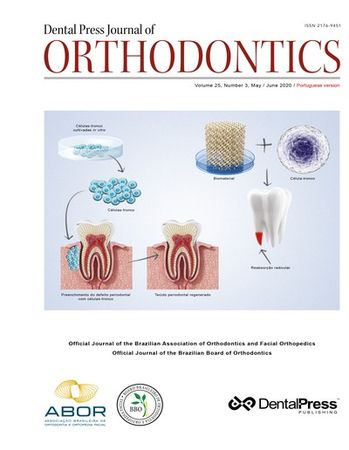Covid 19 pandemic unveiling the opportunities and challenges in orthodontic training
Editorial
The COVID-19 pandemic disrupted every single aspect of society, with most professions having to rapidly adapt to the new circumstances, and these were affected at different levels due to specific demands of contamination control. In the USA, OSHA (Occupational Safety and Health Administration) early on classified Dentistry as a ‘very high-risk’ category, having doctors, staff and patients themselves exposed to aerosol-generating procedures. Clearly, this contamination risk not only impacted orthodontic practice, but also orthodontic training.
Autores: Flavia Artese,







The COVID-19 pandemic disrupted every single aspect of society, with most professions having to rapidly adapt to the new circumstances, and these were affected at different levels due to specific demands of contamination control. In the USA, OSHA (Occupational Safety and Health Administration) early on classified Dentistry as a ‘very high-risk’ category, having doctors, staff and patients themselves exposed to aerosol-generating procedures. Clearly, this contamination risk not only...
Leia mais
Fast-acting orthodontic treatments are desired by both patients and orthodontists. In recent years, a multitude of methods and products have been developed to this end. Osteoperforations are currently in fashion, mainly because the industry was able to take this old idea to sell customized osteoperforators. It is not the product that will make the difference, but rather the procedure. Thus, Iranian researchers developed a study1 aimed at assessing the effect of micro-osteoperforation (MOP),...
Leia mais
Endodontically treated teeth may be moved, as endodontic treatment is not a contraindication for orthodontic treatment. Apical periodontal repair begins when the periapical or pulp lesion has completely resolved. This may happen immediately after treatment if the filling material causes little or no irritation of periapical tissues, and particularly if the material is fully contained within the canal. When it leaks, a foreign body granuloma forms and persists for some months or indefinitely,...
Leia mais
Introduction: Anterior open bite is one of the most difficult malocclusions to correct in orthodontic treatment. Molar intrusion using miniscrew anchorage has been developed as a new strategy for open bite correction; however, this procedure still has an important concern about prolonged treatment duration in the patient with anteroposterior discrepancy due to the separate step-by-step movement of anterior and posterior teeth. Objective: This article illustrates a comprehensive orthodontic...
Leia mais
Introduction: Orthodontic treatment for adults is currently increasing, and therefore the need to bond brackets to restorations and temporary crowns. The use of CAD/CAM PMMA provisional restorations for orthodontic purposes have not yet been described, and there is currently insufficient information regarding the strength of bracket adhesion. Objective: This study aimed at evaluating the effects of thermocycling (TC) and surface treatment on shear bond strength (SBS) of brackets to different...
Leia mais
Introduction: Rapid maxillary expansion (RME) is assumed as a well established procedure; although, some effects on facial complex are not yet fully understood. Objective: The aim of this research was to verify, using cone-beam computed tomography, the effect on linear dimensions of the nasal cavity. Methods: Sample consisted of twenty patients aged 7 to 16 years, with skeletal deformity that justified the use of CT scans, and who required the RME as part of the orthodontic treatment...
Leia mais
Introduction: Orthodontic aligners use have increased in dentistry. The resolution of complex movements such as extrusion demands the use of attachments to reach the aimed force, but just a few studies have been developed to evaluate the biomechanical performance of the aligners and their accessories. Objective: The objective of this study was to evaluate on the three axes (X, Y and Z) the forces generated by three different attachment designs for the extrusion of the maxillary central...
Leia mais
Introduction: The cleft lip and palate is the most frequent craniofacial anomaly and as a consequence of this malformation some inadequate occlusal relationship between the arches are observed. Furthermore, dental absences, individual positioning changes of teeth as rotations, and in more rare situations the transpositions may be found as well. Description: In this context, in this article is reported a case of a 9-year-old patient with unilateral cleft lip and palate, with anterior and...
Leia mais
Introduction: Fixed functional appliances are non-compliant solutions to Class II malocclusion treatment. The clinician, however, should be careful of unexpected complications during the therapy. Methods: 58 female adolescents who presented with Class II malocclusion due to deficient mandible were treated with Forsus Fatigue Resistant Device (FFRD) therapy until an overcorrection to an edge to edge incisor relationship was achieved. Results: Incisor relationship and overjet were corrected...
Leia mais
Introduction: Maxillary deficiency, also called transverse deficiency of the maxilla, may be associated with posterior crossbite, as well as with other functional changes, particularly respiratory. In adult patients, because of bone maturation and the midpalatal suture fusion, rapid maxillary expansion has to be combined with a previous surgical procedure to release the areas of resistance of the maxilla. This procedure is known as surgically-assisted rapid maxillary expansion (SARME)....
Leia mais
Introduction: Stem cells obtained from the pulp of human deciduous teeth are highly proliferative and plastic multipotent cells, which makes them a relevant model of stem cells, applied in several biomedical areas, with different purposes. Objective: Based on a brief review of the literature, the present work intends to present from conceptual aspects about stem cells, classifications, potential (in vitro and in vivo) applications in dental practice, cell culture, cryopreservation and its...
Leia maisCopyright © 1998 - 2022 DentalGO | Todos Direitos Reservados. DentalGO é uma marca Dental Press